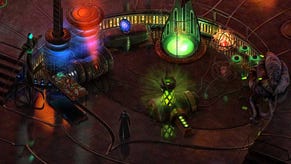In bloom: InXile on Torment Tides of Numenera
Torment: Tides of Numenera lives because gamers voted with their wallets. InXile's Brian Fargo talks to VG247's Dave Cook about the importance of transparency and open dialogue.
It's been a hell of a month for inXile Entertainment. Weeks ago the team was nervously gearing up to publish its Torment: Tides of Numenera Kickstarter campaign, unaware of the mass interest it was about to spark.
Nobody at inXile could have known just how well the project would do ahead of time. After all, the game's spiritual predecessor Planescape: Torment is critically-acclaimed but it hadn't achieved the kind of sales figures that could guarantee success a second time round.
There was a real danger that the original game had fallen into cult status, and that only a small yet dedicated fan base remained. The studio was gambling big with an IP held in the highest regard by fans. Failure simply wasn't an option.
At the time of writing the game has amassed $3,572,796, overshooting its initial $900,000 goal by some way. Over 64,000 people have trusted inXile with their money and want to see the Torment series live on.
Now the studio has to deliver something spectacular in return.
"I think I read recently an article that said Planescape: Torment was the biggest game that most people never played," inXile founder Brian Fargo told me. "It wasn't a huge sales success. So you can imagine my surprise when we hit a million dollars in six hours. It was an incredible morning."
The team released an early animated concept this week set in a hub area called 'The Bloom'.
Fargo and his team believe that Torment: Tides of Numenera would not have existed without the help of Kickstarter and its backers. For one, Wizards of the Coast was reluctant to give up the Planescape license to the studio, and it's hard to imagine a big publisher going for a deep RPG experience in this day and age where blockbuster spectacle is king.
It just goes to show how much standards have changed in the last ten years, and what the juggernauts of the triple-a sector view as 'high-value'. Depth be damned it seems, but the large publisher's loss is the RPG fan's gain in this instance, as inXile is using the transparency afforded by Kickstarter to talk openly with its fans, and to iterate Torment into something most wonderful indeed.
"It's a contrast," Fargo explained. "If you're a developer doing work for a publisher on a triple-a game - had we released the amount of information that we did on our Kickstarter, we would have been sued. There would have been all sorts of things in there to keep our mouths shut, so it just shows you how 'opposite' this process is".
One significant feature borne from the Torment Kickstarter community was epilogues that recap the final world state and summarise a player's choices at the end. It's a system fans of Fallout will be familiar with. The point is that it was a suggestion actively committed to code based on direct fan feedback. There's no middle man, just a developer talking openly with its fans.
Fargo believes that keeping an open dialogue in this manner is crucial, and it's something the whole team holds dear, "We are hanging our hat on reactivity. We need to take that out to a tenth degree whenever we have an opportunity. That's why we want to enter pre-production as soon as possible.
"That's because we can work on those things and churn it, have lots of fresh eyes and iterations on the design document for many months before it hits production. I think that's critical when making these kind of games, because once your production team hits, now your overhead is $150,000 a month or in some cases $2 million a month.
"Once that kicks in there's a natural inclination to just get it done and to not be constantly changing it. I always feel that - during pre-production - changes are free, so you're more creative. But once there are guns to your head you tend to pull that back. Now, that's not to say we won't be iterating throughout the whole product, but it's a different kind of process."
While it's incredible to see Fargo and his team being so transparent about Torment's development, the other side of the fence now seems much darker and slightly sickening. The walled garden of the triple-a market now seems more like a fortress by comparison, so I asked Fargo for his thoughts on the mass market machine.
"With Torment, we wanted to present something that you couldn't get otherwise", said Fargo , underlining the sad truth that the game couldn't exist anywhere but within the independent arena. "There is no way on Earth any big publisher in the world would have made this game. It would never have happened. That's what makes Kickstarter so wonderful.
"It's not exactly a mainstream pitch, and then let's say we have 80,000 backers on Kickstarter - I'm just making up numbers - and we sell another 100,000 copies through digital distribution. That's not worth their time.
"So it's easier for them to sit around and figure out how to sell 100,000 more Call of Dutys than it is to go to all this effort. Now, I'm not banging on the publishers when I say that. I'm just going through the economics of why it's just not worth it."
But Torment's backers have deemed the game worth it by voting with their wallets. This is empowerment you can't buy elsewhere in the industry. From the outside looking in it may seem that inXile is riding the crest of the crowd-funded wave, answering to no higher power and cutting loose with its ideas.
In reality it answers to you, the investor and Fargo and his team respect your opinion and your assistance with deep sincerity. I can tell just by talking with Fargo on the phone that he is thankful for the support and that inXile can continue to control its IP freely. I close our chat by asking him to reflect on the funding drive's success.
"I can't even describe the feeling. It's such an emotional high when you've got that kind of support, and then you know what it means. It means that all my guys have jobs for years, and that I get to create the kind of games that I love to do. It means so much."
"It's not some abstract concept. It's not some extra profit margin line. It goes right to the products and my guys' jobs for their ability to do it. So yeah, there's no better feeling in the world."
Torment: Tides of Numenera launches at some point in 2015, following yesterday's delay.












